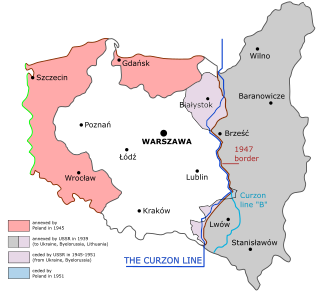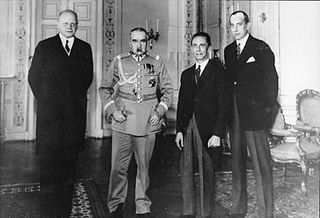
Pax Britannica refers to the relative peace between the great powers in the time period roughly bounded by the Napoleonic Wars and World War I. During this time, the British Empire became the global hegemonic power, developed additional informal empire, and adopted the role of a "global policeman".
Diplomatic history deals with the history of international relations between states. Diplomatic history can be different from international relations in that the former can concern itself with the foreign policy of one state while the latter deals with relations between two or more states. Diplomatic history tends to be more concerned with the history of diplomacy, but international relations concern more with current events and creating a model intended to shed explanatory light on international politics.
The history of interwar Poland comprises the period from the revival of the independent Polish state in 1918, until the Invasion of Poland from the West by Nazi Germany in 1939 at the onset of World War II, followed by the Soviet Union from the East two weeks later. The two decades of Poland's independence between the world wars are known as the Interbellum.

The Curzon Line was a proposed demarcation line between the Second Polish Republic and the Soviet Union, two new states emerging after World War I. Based on a suggestion by Herbert James Paton, it was first proposed in 1919 by Lord Curzon, the British Foreign Secretary, to the Supreme War Council as a diplomatic basis for a future border agreement.

France–Germany relations or the Franco-German relations form a part of the wider politics of the European Union. The two countries have a long – and often contentious – relationship stretching back to the Middle Ages. After World War II, the two nations have largely reconciled. Since the signing of the Treaty of Rome in 1958, they have been among the founders and leading members of the European Communities and later the European Union.

The German–Polish declaration of non-aggression, also known as the German–Polish non-aggression pact, was an agreement between Nazi Germany and the Second Polish Republic that was signed on 26 January 1934 in Berlin. Both countries pledged to resolve their problems by bilateral negotiations and to forgo armed conflict for a period of 10 years. The agreement effectively normalised relations between Poland and Germany, which had been strained by border disputes arising from the territorial settlement in the Treaty of Versailles. The declaration marked an end to an economically damaging customs war between the two countries that had taken place over the previous decade.
Piotr Stefan Wandycz was a Polish-American historian. He was also the President of the Polish Institute of Arts and Sciences of America, and professor emeritus at Yale University, specializing in Eastern and Central European history.

Relations between the Russian Empire and the United States predate the American Revolution, when the Russians began trading with the Thirteen Colonies in violation of the British Navigation Acts. The Russian government officially recognized the United States in 1803, and the two countries established diplomatic relations in 1809. From the 18th century until 1917, the United States and Russia maintained mostly cordial relations, with occasional cultural and commercial exchanges. Russia remained neutral during the American Civil War, and sold Alaska to the United States in 1867. The surrender and dissolution of the Russian Empire facilitated Americans to join the war, although they sided with Russia during the latters civil war.

The Molotov–Ribbentrop Pact was an August 23, 1939, agreement between the Soviet Union and Nazi Germany colloquially named after Soviet foreign minister Vyacheslav Molotov and German foreign minister Joachim von Ribbentrop. The treaty renounced warfare between the two countries. In addition to stipulations of non-aggression, the treaty included a secret protocol dividing several eastern European countries between the parties.
History of the United States foreign policy is a brief overview of major trends regarding the foreign policy of the United States from the American Revolution to the present. The major themes are becoming an "Empire of Liberty", promoting democracy, expanding across the continent, supporting liberal internationalism, contesting World Wars and the Cold War, fighting international terrorism, developing the Third World, and building a strong world economy with low tariffs.

This timeline covers the main points of British foreign policy from 1485 to the early 21st century.

This article covers worldwide diplomacy and, more generally, the international relations of the great powers from 1814 to 1919. This era covers the period from the end of the Napoleonic Wars and the Congress of Vienna (1814–1815), to the end of the First World War and the Paris Peace Conference (1919–1920).

The Polish question was the issue, in international politics, of the existence of Poland as an independent state. Raised soon after the partitions of Poland in the late 18th century, it became a question current in European and American diplomacy throughout the 19th and parts of the 20th centuries. Historian Norman Davies notes that the Polish question is the primary lens through which most histories of Europe discuss the history of Poland, and was one of the most common topics of European politics for close to two centuries. The Polish question was a major topic at all major European peace conferences: at the Congress of Vienna in 1815, at the Versailles Conference in 1919, and at the Yalta Conference and the Potsdam Conference in 1945. As Piotr Wandycz writes, "What to the Poles was the Polish cause, to the outside world was the Polish question."
The history of French foreign relations covers French diplomacy and foreign relations down to 1981. For the more recent developments, see foreign relations of France.
The history of the foreign relations of the United Kingdom covers English, British, and United Kingdom's foreign policy from about 1500 to 2000. For the current situation since 2000 see foreign relations of the United Kingdom.
International relations (1919–1939) covers the main interactions shaping world history in this era, known as the interwar period, with emphasis on diplomacy and economic relations. The coverage here follows the diplomatic history of World War I and precedes the diplomatic history of World War II. The important stages of interwar diplomacy and international relations included resolutions of wartime issues, such as reparations owed by Germany and boundaries; American involvement in European finances and disarmament projects; the expectations and failures of the League of Nations; the relationships of the new countries to the old; the distrustful relations between the Soviet Union and the capitalist world; peace and disarmament efforts; responses to the Great Depression starting in 1929; the collapse of world trade; the collapse of democratic regimes one by one; the growth of economic autarky; Japanese aggressiveness toward China; fascist diplomacy, including the aggressive moves by Fascist Italy and Nazi Germany; the Spanish Civil War; the appeasement of Germany's expansionist moves toward the Rhineland, Austria, and Czechoslovakia, and the last, desperate stages of rearmament as another world war increasingly loomed.
The history of German foreign policy covers diplomatic developments and international history since 1871.
The diplomatic history of World War I covers the non-military interactions among the major players during World War I. For the domestic histories of participants see home front during World War I. For a longer-term perspective see international relations (1814–1919) and causes of World War I. For the following (post-war) era see international relations (1919–1939). The major "Allies" grouping included Great Britain and its empire, France, Russia, Italy and the United States. Opposing the Allies, the major Central Powers included Germany, Austria-Hungary, the Ottoman Empire (Turkey) and Bulgaria. Other countries also joined the Allies. For a detailed chronology see timeline of World War I.

International relations from 1648 to 1814 covers the major interactions of the nations of Europe, as well as the other continents, with emphasis on diplomacy, warfare, migration, and cultural interactions, from the Peace of Westphalia to the Congress of Vienna.
France and the League of Nations was a major theme of French foreign policy in the 1920s and 1930s. France and the United Kingdom were the two dominant players in world affairs and in League affairs, and usually were in agreement. The League proved ineffective in resolving major problems. In 1945 it was replaced with the United Nations, where France played a major role despite its much weaker status. However in the 1920s and 1930s the main themes of French foreign policy focused on defense against Germany, and took place outside of League jurisdiction.









